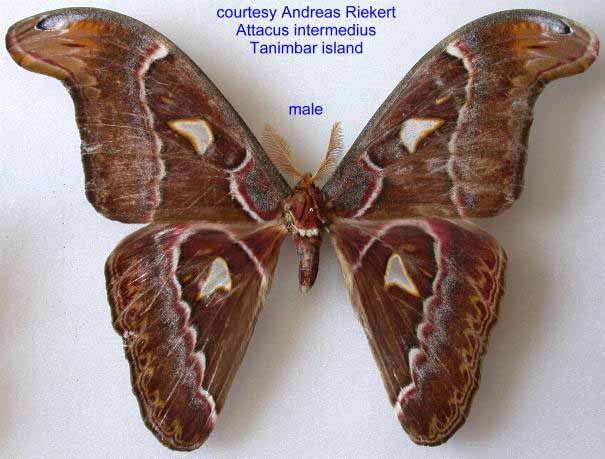Attacus intermedius
Jurriaanse & Lindemans, 1920

Attacus intermedius male, Tanimbar Island,
courtesy of Andreas Riekert, Germany
TAXONOMY:Superfamily: Bombycoidea, Latreille, 1802 |
"Asian Spring Blossoms" |
DISTRIBUTION:
The Attacus intermedius moth (wingspan 22cm) flies only in the Tanimbar Islands.
These moths can be quite variable, but the forewing fenestrae are generally crescent shaped and there seems to be a general absence of orange scaling. Submarginal lines are red, and the hindwing submarginal area has much dark "ornamentation".
Ric Peigler writes, November 10, 2004, "I consider suparmani to be an obvious synonym of intermedius, which was implied when I cited the number of known Attacus species as 14 in the Samia revision."
Visit Attacus suparmani, Alor Islands. It may well be the same as A. intermedius.
FLIGHT TIMES AND PREFERRED FOOD PLANTS:
Attacus intermedius possibly broods
continuously. Records exist, however, only from November-March.
Larvae may be polyphagus and probably feed on Nauclea orientalis (Rubiaceae), guyabano, "atis"
(custard apple) (Annonaceae), Sandoricum koetjape (santol), "banaba" (Tagalog name)
and Hibiscus sp. Ligustrum would be a good choice for captive rearing out of natural range..
ECLOSION, SCENTING AND MATING:
Females extend a scent gland from the posterior tip
of the abdomen to call in night-flying males. Moths are acttive from 10:00 pm until 1:00 am with peak activity
between 11:00 and midnight.
EGGS, LARVAE, COCOONS, AND PUPAE:
The larvae have dorsal scoli up to 7mm in length, and the anal
patch is solid without a ring. The cocoon is typical of this genus.
Larval Food Plants
It is hoped that this
alphabetical listing followed by the common name of the foodplant will
prove useful. The list is not exhaustive. Experimenting with closely
related foodplants is worthwhile.
EGGS, LARVAE, COCOONS, AND PUPAE:
The larvae have dorsal scoli up to 7mm in length, and the anal
patch is solid without a ring. The cocoon is typical of this genus.
Larval Food Plants
It is hoped that this
alphabetical listing followed by the common name of the foodplant will
prove useful. The list is not exhaustive. Experimenting with closely
related foodplants is worthwhile.
Larval Food Plants
Use your browser "Back" button to return to the previous page.
Return to Attacus genus
Goto Asian Pacific Saturniidae Directory